Best Trowel for Backpacking
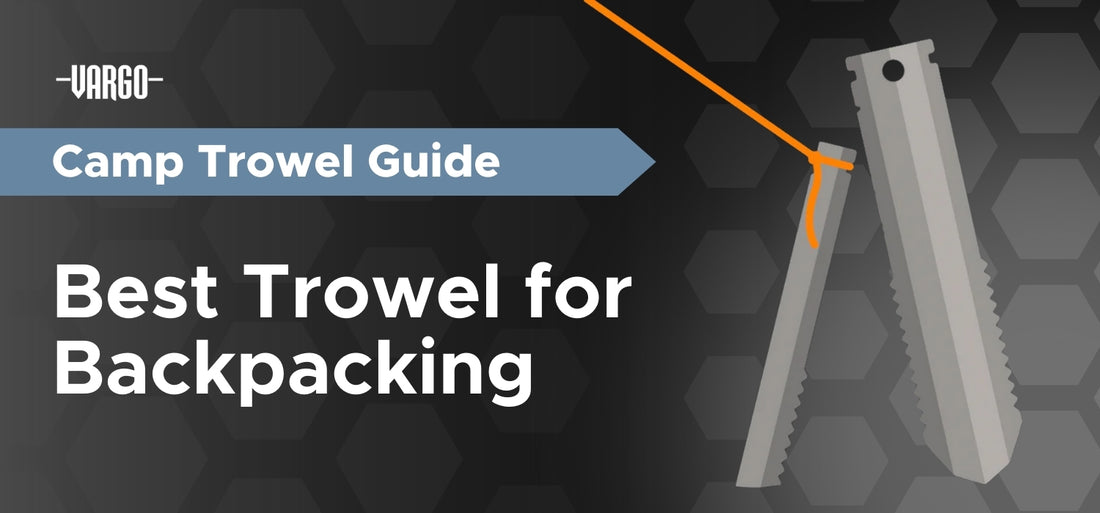
Embracing the wilderness means being prepared for all aspects of nature, including digging your own cathole. Transitioning to a true outdoors person requires the right tools, like a sturdy camp trowel for responsible backcountry camping.
Trowels have a long history, from Neolithic tools to modern-day camping essentials, highlighting their importance in minimizing environmental impact. You should choose a trowel that suits your adventure needs, whether for lightweight backpacking or rugged, remote camping.
Leave No Trace Reminders
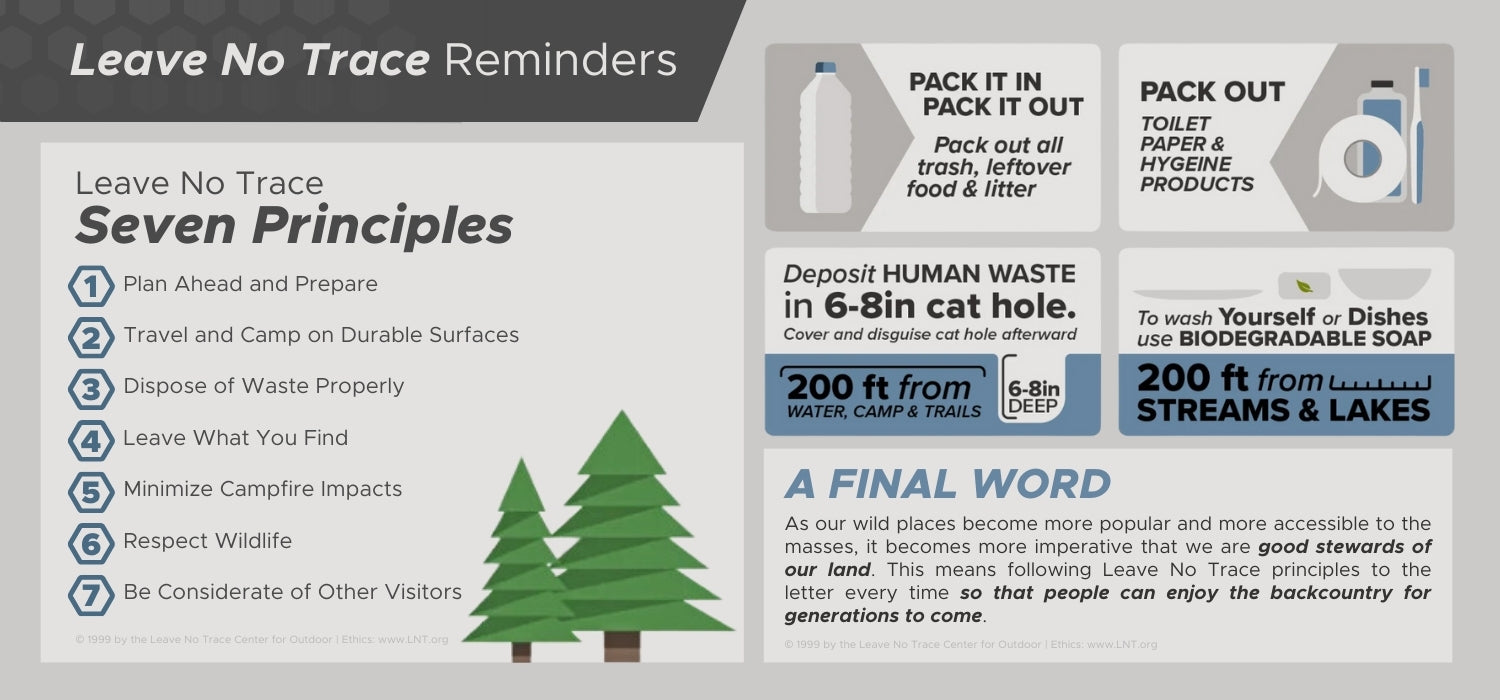
Before selecting the ideal camp trowel, it is crucial to grasp the significance of reducing our environmental footprint. Leave No Trace Principles are guidelines that emphasize planning, respecting wildlife, minimizing campfire impacts, and ensuring proper waste disposal.
The seven principles are as follows:
- Plan ahead and prepare.
- Travel and camp on durable surfaces.
- Dispose of waste properly.
- Leave what you find.
- Minimize campfire impacts.
- Respect wildlife.
- Be considerate of other visitors.
For disposing of waste properly, the official Leave No Trace website has these to say:
- Pack it in, pack it out. Inspect your campsite and rest areas for trash or spilled food. Pack out all trash, leftover food, and litter.
- Deposit solid human waste in catholes dug 6 to 8 inches deep, at least 200 feet from water, camp, and trails. Cover and disguise the cathole when finished.
- Pack out toilet paper and hygiene products.
- To wash yourself or your dishes, carry water 200 feet away from streams or lakes and use small amounts of biodegradable soap. Scatter strained dishwater.
Properly using a trowel to manage waste is a key component, involving packing out trash and using catholes for human waste, highlighting the responsibility to maintain the pristine nature of outdoor spaces.
Recently, rangers in our state and national parks have been increasingly frustrated with tourists and their lack of ethical outdoor waste disposal. As our wild places become more popular and more accessible to the masses, it becomes more imperative that we are good stewards of our land.
Embracing these practices ensures our natural areas remain beautiful and accessible for future generations.
What Trowels to Use for the Backcountry
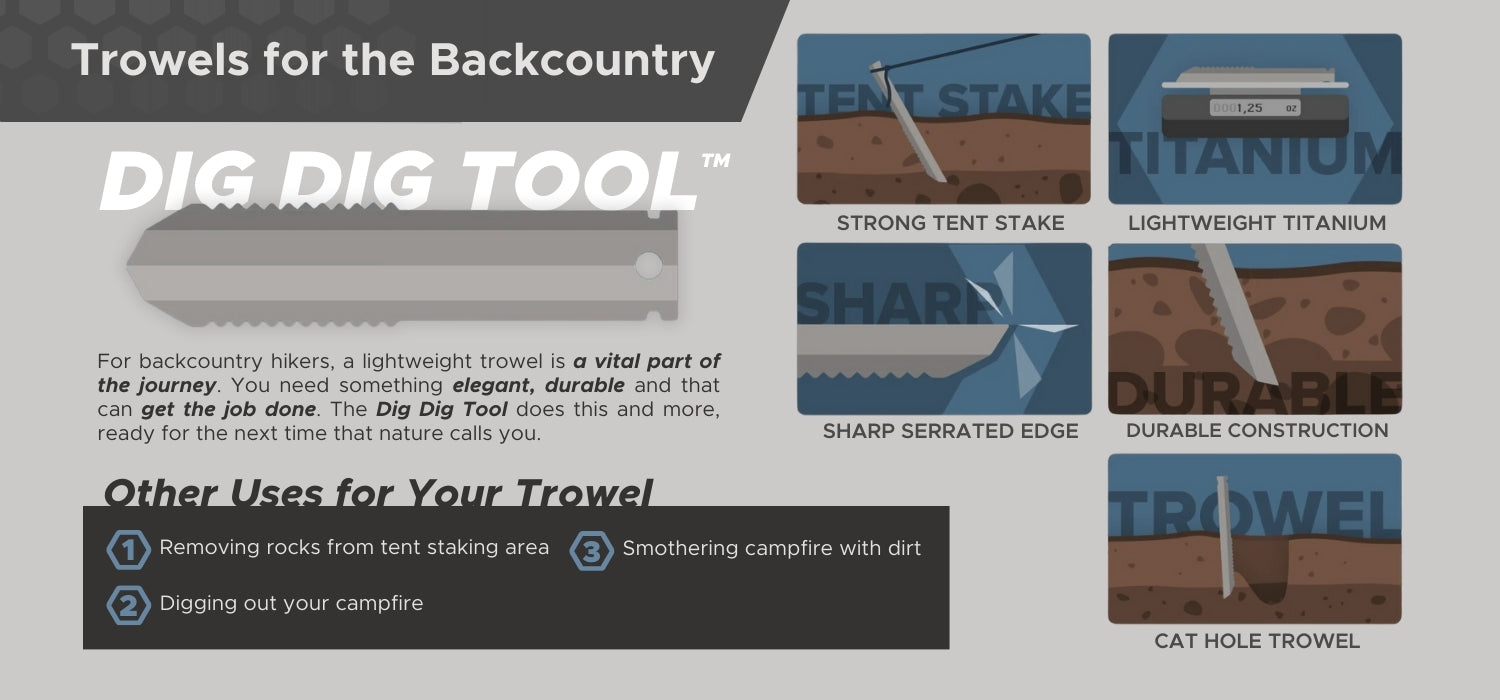
I have two trowels:
- A backcountry hiking and camping trowel which is lightweight and small.
- A heavy-duty, metal trowel for remote camping trips.
In the backcountry, the right trowel makes all the difference. Whether you're a minimalist or need something more robust for remote camping, the key is finding a trowel that's lightweight yet durable.
Explore the functionality and versatility of various trowels like Vargo's Dig Dig Tool to enhance your outdoor experience responsibly. It stands out for its dual functionality as both a cathole trowel and a tent stake, boasting a lightweight titanium build.
Its design is not only sturdy but also versatile, perfect for digging and cutting through tough terrain without adding unnecessary weight to your pack.
- Made from titanium, it only weighs 1.25 ounces and won’t break like many plastic trowels.
- The serrated edge makes digging or cutting through roots simple and could also be used to cut cordage, plastic, or light cloth in a bind.
Anyone who has staked a tent knows that there’s always one rocky spot where you just can’t seem to pound in the flimsier stakes. Just use your Dig-Dig Tool and problem solved!
Discover more about the Dig-Dig Tool's features here.
Other Uses for Your Trowel
Trowels are multi-purpose in the backcountry and, depending on their size and durability, can be used for any of the following:
- Removing pesky rocks from the area where you’re trying to stake your tent
- Digging out your campfire
- Applying dirt to your campfire to make sure it’s properly smothered
How to Keep Your Trowel in Good Condition
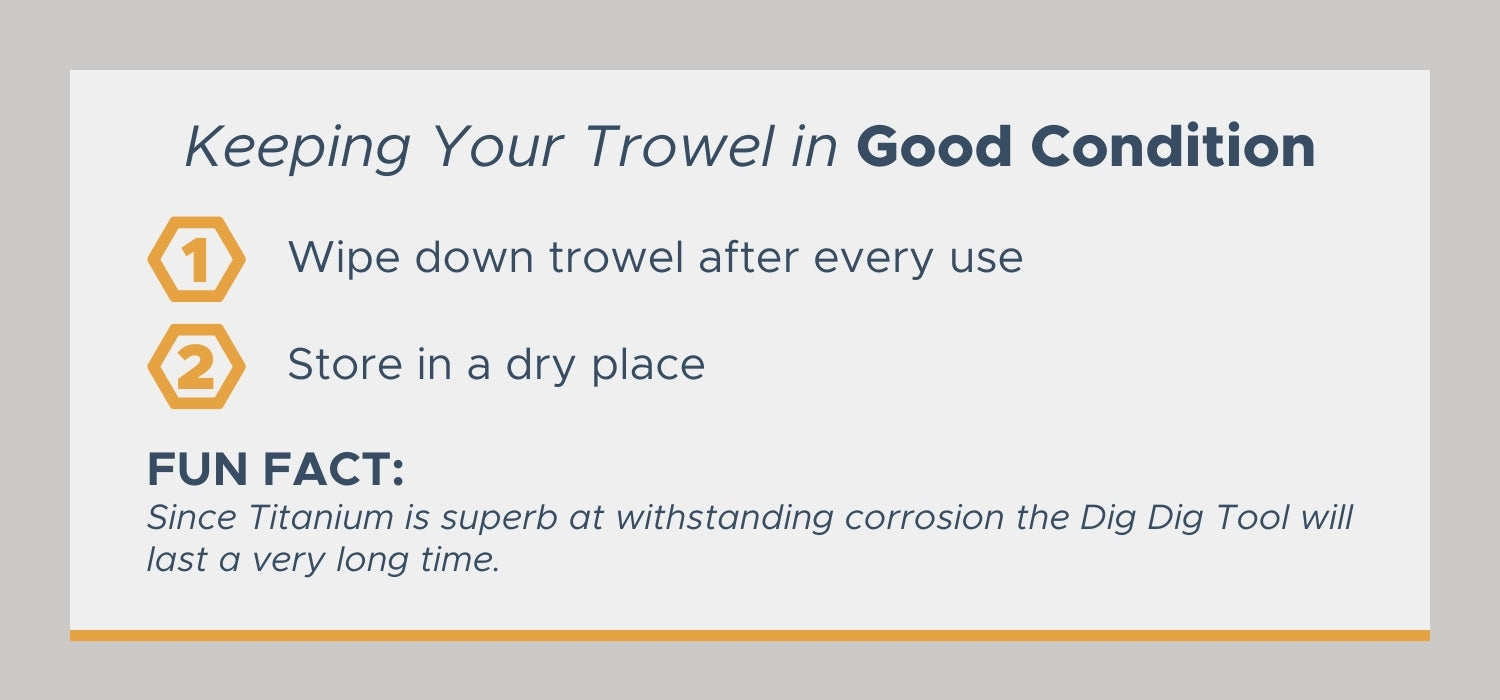
You should wipe down your trowel after every use. Leaving caked mud and grit on your gear will wear it out much earlier.
If your trowel is made of metal, it’s important to store it in a dry place. I typically carry my trowel in a plastic Ziploc bag and store it with other backcountry gear in a plastic container in my cool/dark garage.
Tips for Those Who Are Shy
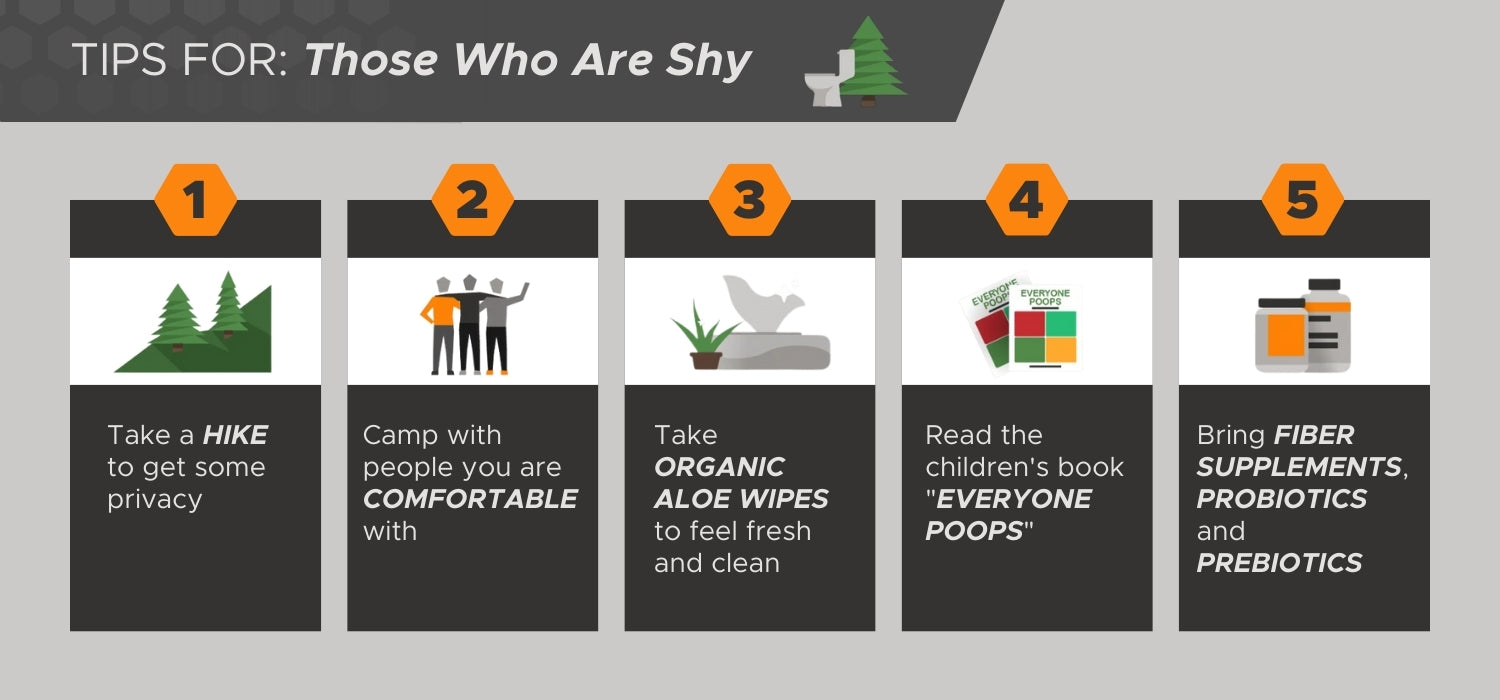
Some of us are shy-poopers and that’s ok! If you’re not yet comfortable with bodily functions in the outdoors follow these tips:
- Instead of announcing to your hiking or camping party that you are off to dig a poop hole, simply say you want some alone time in the woods. Go for a short solo hike and then find a spot that works best for you.
- Camp or backcountry hike for the first time with people who are the same sex. It might be a little easier to dig a poop hole in front of your best gal-pals than in front of your boyfriend or guy friends. The same goes for dudes.
- Bring organic aloe wipes so that you will feel clean and fresh afterward.
- Read the children’s book “Everyone Poops”. It might sound silly but it also might help you get over your shyness.
- Bring fiber supplements, probiotics, and prebiotics on backcountry hikes and camping trips. Being stopped up while you’re trying to hike mountains is terrible and painful! The easier it is for your body to do what is natural, the less issue you’ll have with doing your business when the time comes.
Final Thoughts
Accepting the true essence of outdoor adventures means being prepared, and a durable, lightweight camp trowel is indispensable for responsible wilderness exploration. The right trowel, like the versatile Vargo Dig Dig Tool, not only minimizes environmental impact but also serves multiple purposes, from digging catholes to securing tents.
This piece of equipment signifies a commitment to preserving nature's beauty for future generations, embodying the Leave No Trace principles. As you select your next camp trowel, consider its impact not only on your camping experience but also on the environment!
